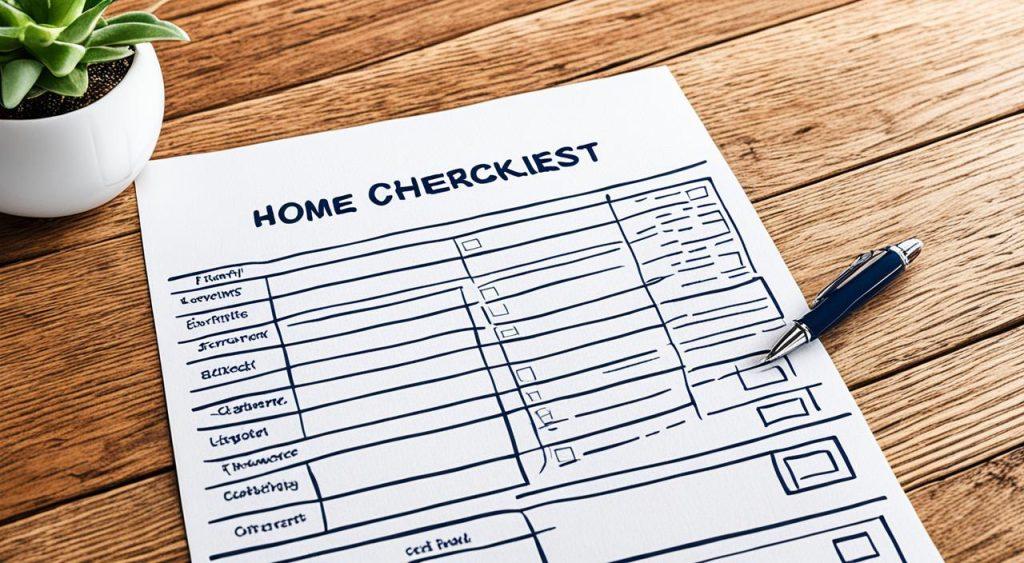Find the Perfect Home for Your Family – Real Estate
Table of Contents
Did you know the average American family moves about 11 times in their lifetime? With such a high number of moves, it’s essential to know what to look for in a home. This guide will equip you with the necessary tools and strategies to navigate the real estate market effectively. It aims to help you find a home that suits your family’s unique needs and preferences.

Buying a home is an exciting journey, and the right guidance can simplify it. You’ll need to consider various factors, including price, location, community amenities, and school districts. This article will guide you through these aspects, ensuring you’re well-prepared to find a home that aligns with your family’s lifestyle and needs.
Understanding Your Home Buying Needs
Buying a home is a major investment. It’s vital to make sure the property fits your must-have features and dream home checklist. Take time to think about your home needs and preferences. This will guide you in picking the home amenities most crucial for you and your family.
What Does Your Ideal Home Look Like?
Begin by listing the essential features you need in a home, like the number of bedrooms and bathrooms, kitchen size, and backyard area. Also, note down the “nice-to-have” features that would be great but aren’t essential. These lists will make the home buying process easier when you start looking at properties.
Your dream home checklist might change as you go through the home buying process. Stay adaptable and open to making compromises. Finding the ideal home often means balancing your needs with what’s available in the market.
- Identify your must-have home features, such as number of bedrooms and bathrooms, kitchen size, and backyard space.
- Create a list of “nice-to-have” home amenities that would be a bonus but aren’t essential.
- Remain open-minded and flexible as you navigate the home buying process.

“Prioritizing your home needs and preferences is the key to finding a property that truly feels like your dream home.”
Determining Your Housing Budget
Before you start the home buying process, it’s essential to set a realistic housing budget. This includes more than just the monthly mortgage payment. You must consider property taxes, homeowner’s insurance, and potential home repairs. This comprehensive approach ensures your new home aligns with your financial situation.
A home affordability calculator is a valuable tool. It takes your income, debts, and other financial details to estimate your maximum monthly payment. Experts suggest your total monthly housing expenses should not exceed 28% of your gross monthly income.
When budgeting for homeownership, remember to consider your overall debt-to-income ratio. Lenders look for your mortgage payment and other monthly debts to leave enough room for other expenses. By planning ahead, you can find a home that suits your financial needs and lifestyle.

“The key to successful homeownership is preparing your finances before you start house hunting.”
- Use a home affordability calculator to estimate your maximum monthly payment
- Factor in all monthly housing expenses, not just the mortgage
- Ensure your total housing costs don’t exceed 28% of your gross monthly income
- Consider your overall debt-to-income ratio to ensure mortgage affordability
Understanding Mortgage Options
Purchasing a home is a significant financial decision, and understanding your mortgage options is crucial. Whether you’re a first-time homebuyer or an experienced investor, it’s vital to know the different loan types and requirements. This knowledge helps you make an informed decision and secure the best possible financing.
Pre-Qualifying for a Mortgage
Getting pre-qualified for a mortgage is an essential first step in the home-buying process. This process involves working with a lender to determine your borrowing power. They assess your credit score, income, and debt-to-income ratio. By obtaining a pre-approval letter, you’ll know your budget clearly and show sellers you’re a serious, qualified buyer.
When considering mortgage pre-approval, several loan types and requirements are important to note, including:
- Conventional loans: These typically require a 20% down payment and have stricter credit and income requirements.
- FHA loans: Insured by the Federal Housing Administration, these loans often have more lenient requirements and a lower down payment of 3.5%.
- VA loans: Available to eligible military members and veterans, VA loans offer 100% financing with no down payment required.
You’ll also need to prepare for closing costs, which can range from 3-5% of the home’s purchase price. These costs include fees such as appraisal, title insurance, and origination charges.
“Getting pre-approved for a mortgage will not only give you a clear idea of your borrowing power, but it will also make you a more attractive buyer to sellers.”

Understanding your mortgage options and getting pre-qualified puts you in a stronger position to find the perfect home for your family.
Choosing the Right Location
Finding the perfect home for your family means considering more than just the house itself. The location is equally important. Spend time researching neighborhoods to understand how factors like school quality, commute time, and community amenities affect your life and property value.
Begin by assessing neighborhoods you’re interested in. Examine home values, crime rates, and the area’s atmosphere. Drive through and speak with neighbors to gauge community spirit. Think about how close you are to work, schools, and other important locations. A shorter commute can greatly reduce daily stress.
Even if you don’t have kids, evaluate the local school district. Good schools benefit your children’s education and can increase your home’s value. Look for high test scores, low teacher-student ratios, and rich extracurricular activities.
Lastly, check out the community amenities. Parks, recreational centers, shops, and restaurants can make living there more enjoyable. By weighing these factors, you can pick a location that meets your family’s needs and tastes.
“The right location can make all the difference in transforming a house into a true home.”
Researching Potential Homes
After narrowing your home search, it’s time to delve deeper into the properties you’re eyeing. A comprehensive background check on each home can offer insights crucial for a well-informed decision.
Uncovering the Home’s History
Begin by exploring the history of each property, including its market time and any recent price adjustments. Look out for red flags like frequent foreclosures or significant price drops in the area. Such information sheds light on the home’s true worth and potential issues.
Analyzing Recent Sales Data
Delve into recent sales data for similar homes nearby. Compare these prices to understand current market trends and value ranges. This comparison can be a strong bargaining tool, aiding in setting a fair offer price.
Monitoring Foreclosure Rates
Keep a close watch on foreclosure rates in the neighborhood. A high foreclosure rate may signal economic instability or other issues affecting the home’s value and your investment. Staying updated on these trends helps you assess the potential risks and rewards of a property.
Through diligent research, you’ll gain a deeper grasp of the market, empowering you to make a confident, informed choice. This effort will significantly benefit you, leading to the ideal home for your family.
Working with a Real Estate Agent
Embarking on the journey to buy a home can seem overwhelming. Yet, a skilled real estate agent can significantly ease this process. They bring deep knowledge of the local market, offering insights and advice crucial for finding the ideal home for your family.
When selecting an agent, evaluate their experience, sales history, and how they communicate. This ensures you find someone who will effectively guide you through the home-buying process.
Key Responsibilities of a Real Estate Agent
- Helping you understand the local market and identify potential properties that match your needs and budget
- Providing negotiation assistance to ensure you get the best possible deal on your new home
- Handling the necessary paperwork and coordinating the various steps of the home-buying process on your behalf
A proficient real estate agent is crucial in your quest for the perfect home. Their expertise and connections can greatly aid in finding a property that suits your family’s lifestyle and budget.
“A good real estate agent can make all the difference in the home-buying process. They’ll be your guide, advocate, and negotiation partner every step of the way.”
Choosing the right real estate agent is pivotal for a smooth and successful home-buying journey. Invest time in finding someone you trust, who will diligently work to meet your home-buying objectives.
Remaining Flexible
Buying a home is an exciting yet challenging journey. It’s natural to have a clear vision of your dream home. However, it’s crucial to stay flexible during your search. Sometimes, you must make compromises to find a property that suits your budget and lifestyle.
Flexibility is key. Don’t get too caught up in a home’s current state. Instead, envision how you can transform it into your ideal living space. Cosmetic changes like painting, updating fixtures, or minor renovations can significantly personalize a property, making it truly yours.
“The secret to finding your perfect home is to keep an open mind and focus on the potential, not just the existing state of the property.”
Be open to compromising on certain features that aren’t essential. Maybe the backyard isn’t as large as you desired, or the kitchen requires updates. By focusing on your must-have items and being flexible on others, you’ll increase your chances of finding a home that meets most of your needs.
The home buying process is rarely flawless, but with the right mindset and creativity, you can turn a good house into your dream home. Keep your focus on the potential, be ready to make compromises, and trust that the right property will emerge when the time is right.
Find the Perfect Home for Your Family – Real Estate
Today’s housing market presents both challenges and opportunities for finding your dream home. The real estate trends, influenced by the pandemic, have made the market competitive. Yet, with strategic planning and a knowledgeable real estate agent, securing the ideal home for your family is achievable.
Understanding the current housing market trends is vital. The pandemic has increased demand for larger homes due to remote work and virtual schooling. This has resulted in a shortage of properties, leading to bidding wars and fast sales. To stay competitive, it’s crucial to grasp the market dynamics and be ready to act quickly when opportunities arise.
Setting a budget is the first step in your home-buying journey. Assessing your financial situation ensures you find a home that meets your lifestyle and future plans. Look into different mortgage options, including pre-qualification, to understand your borrowing potential and set realistic expectations.
“The key to securing a home in a competitive market is to be well-informed, financially prepared, and work closely with a reputable real estate agent.”
Choosing the right location is crucial for your perfect home. Consider factors like school districts, commute times, and amenities that suit your family’s needs. Detailed research and a discerning eye can uncover neighborhoods offering the ideal mix of convenience and community.
By grasping the housing market trends, the pandemic’s effects on home buying, and strategic approaches, you can overcome the competitive landscape. With a trusted real estate agent and a clear budget and preferences, securing the ideal home for your family is within reach.
Making an Offer and Negotiating
After finding the ideal home for your family, it’s time to submit a strong offer. This step involves the art of negotiation. Your real estate agent will help you craft a competitive offer, considering the home’s value, recent sales, and your financials.
Negotiation strategies are crucial for securing the best deal on your new home. Your agent will guide you through this process, ensuring you understand the seller’s perspective and remain flexible. By doing so, you can often reach a mutually beneficial agreement.
The Art of Negotiation
Effective negotiation balances assertiveness with compromise. When submitting your offer, justify your price with market data and the home’s condition. Be open to reasonable counteroffers from the seller. Working together to find a middle ground can often lead to a successful transaction.
- Research recent sales of similar properties in the area to determine a fair offer price.
- Communicate your reasoning clearly and be willing to negotiate in good faith.
- Remain flexible and consider the seller’s perspective to find a mutually agreeable solution.
“The key to successful negotiation is finding common ground and creating a win-win scenario for both parties.”
By employing these negotiation strategies and working with your real estate agent, you’ll be well on your way to securing the perfect home for your family.
The Home Inspection Process
As you near the purchase of your dream home, a professional home inspection is a vital step. This unbiased evaluation offers crucial insights into the property’s condition. It helps you spot potential issues and negotiate repairs.
Investing in a home inspection is a wise move. A qualified inspector provides a detailed look at the home’s structure, mechanical systems, and potential problems. This knowledge is invaluable during negotiations, allowing you to negotiate a fair price or ensure the seller fixes issues.
“A home inspection is like a financial x-ray – it reveals the true condition of the property, helping you make an informed decision that protects your investment.”
The significance of a home inspection cannot be overstated. It aids in making a well-informed investment decision, spotting potential issues early, and negotiating repairs or a fair price. This step ensures you proceed with the home-buying process confidently and enjoy your new home with peace of mind.
- Identify potential issues: The inspection reveals hidden problems, from structural defects to electrical or plumbing concerns, giving you a full picture of the property’s state.
- Negotiate repairs: With the inspection report in hand, you can negotiate with the seller to fix issues or adjust the purchase price.
- Protect your investment: A detailed inspection ensures a wise financial decision, reducing the risk of unexpected, costly repairs later on.
Don’t overlook the home inspection process – it’s key to securing the perfect home for your family. A professional assessment allows you to make an informed decision and negotiate with confidence. This ensures your new home is in excellent condition.
Closing on Your New Home
Congratulations! You’ve navigated the home buying process and found the perfect property for your family. Now, it’s time to take the final steps before move-in and celebrate your homeownership. The closing process overview involves signing the necessary paperwork, transferring the title, and finalizing the mortgage.
The closing process is the final hurdle before you can officially call your new house a home. This stage involves reviewing and signing a stack of legal documents, including the mortgage, deed, and title transfer. Your real estate agent and lender will guide you through this process, ensuring everything is in order.
- Review and sign the mortgage and other closing documents
- Finalize the transfer of the property title to your name
- Provide any remaining funds required for the down payment and closing costs
- Receive the keys to your new home!
Once the final steps before move-in are complete, you’ll be ready to start the next chapter of your life in your new home. Take a moment to celebrate homeownership – this is a significant milestone that deserves recognition. You’ve worked hard to reach this point, and now it’s time to enjoy the fruits of your labor.
“Homeownership is the cornerstone of the American Dream. Congratulations on making it a reality!”
With the closing process behind you, the path is clear for you to move in and start creating memories in your new home. Embrace the excitement of this transition and look forward to the journey ahead.
Conclusion
The quest for the ideal home for your family has been both thrilling and demanding. You’ve assessed your needs, set a realistic budget, and worked with a seasoned real estate agent. This approach has helped you navigate the complex real estate market and find a home that fits your lifestyle perfectly. It’s crucial to stay flexible, conduct thorough research, and leverage all available resources.
As you move forward, remember these key takeaways: stay true to your priorities, be open to making compromises, and trust your real estate expert. With the right strategy, you’ve found a family home that will be the cornerstone of many memories and moments to cherish.
For resources for further information, the real estate field is abundant with online forums, blogs, and professional organizations offering valuable insights and advice. Also, don’t hesitate to contact your real estate agent for any post-closing queries or concerns. Their commitment to your satisfaction reflects their dedication to aiding you in finding the perfect home.
In final thoughts, the real estate journey you’ve embarked upon has been both challenging and rewarding. By staying focused, patient, and adaptable, you’ve successfully navigated the process and secured a home that will be the backdrop for your family’s next chapter. Congratulations on this significant achievement, and may your new home be filled with joy, comfort, and enduring memories.
FAQ
What are the must-have features in my dream home?
Start by thinking about the essential features you need, like the number of bedrooms and bathrooms, the kitchen and backyard size, or the layout you prefer. Then, list the “nice-to-have” features that would be a bonus. This approach simplifies the home buying process.
How do I determine a realistic housing budget?
Consider not just the monthly mortgage payment but also property taxes, homeowner’s insurance, and potential repairs. Use a mortgage calculator to estimate your monthly payment. Ensure your total housing costs don’t exceed 28% of your gross monthly income. Remember to consider your overall debt-to-income ratio to ensure you can afford the mortgage comfortably.
What are the different mortgage loan options available?
Explore conventional, FHA, and VA loans, each with unique requirements and benefits. Getting pre-approved for a mortgage reveals your borrowing power and makes you a more attractive buyer to sellers.
What should I look for when researching potential neighborhoods?
Understand the neighborhoods by looking into home values, school quality, and community amenities. Drive around to feel the area’s vibe and talk to neighbors. Consider commute time, schools, and other frequent destinations.
How can I research the history of a property?
Look into each property’s history, including its market time, price changes, and similar homes’ sale prices. Watch for red flags like high foreclosure rates or significant price drops. This helps you understand the home’s true value and aids in making an informed choice.
What should I look for in a real estate agent?
Ask potential agents about their experience, successful sales record, and communication style to find a good fit. A skilled agent knows the local market, offers valuable insights, and handles paperwork and negotiations for you.
How can I negotiate the best deal on my new home?
Work with your agent to craft a competitive offer based on the home’s value, recent sales, and your finances. Be ready to negotiate, as it’s often crucial. Your agent can guide you through negotiation, helping you secure the best deal on your home.
Why is a home inspection so important?
A home inspection provides an unbiased look at the property’s condition and highlights any issues or repairs needed. This info can help you renegotiate the price or ask the seller to fix things. The inspection is a key step in ensuring your investment is sound.


